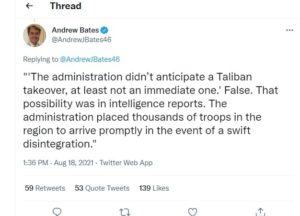Is it possible the Taliban offensive in Afghanistan, culminating just days ago in the overrunning of Kabul, caught the Biden administration and the Pentagon completely off guard? No, it is not, and any suggestion to the contrary would be disingenuous at best. Still, the Department of Defense and the White House both deny intelligence assessments indicated a possibility that the terrorist organization intended to retake the country, oust the Afghan government, and declare an “Islamic Emirate” with such speed.
For months, the administration told the American people a Taliban takeover in the near future was unlikely enough to be of little concern. In early July, Joe Biden said the prospect of the Taliban “overrunning everything and owning the whole country” was “highly unlikely.” Secretary of State Antony Blinken issued an equally inaccurate prediction: “If there is a significant deterioration in security,” he told Congress in June, “I don’t think it’s going to be something that happens from a Friday to a Monday.”
 Then, of course, there was Biden’s insistence that there would be “no circumstance” in which a Saigon scenario would play out, with Americans being evacuated by helicopter from the roof of the U.S. Embassy. As it turned out, that is exactly what happened.
Then, of course, there was Biden’s insistence that there would be “no circumstance” in which a Saigon scenario would play out, with Americans being evacuated by helicopter from the roof of the U.S. Embassy. As it turned out, that is exactly what happened.
Mixed Messages
Other statements from both the Pentagon and the White House, however, suggest they were made aware how swiftly events might unfold. Referring to one recent media report, White House Deputy Press Secretary Andrew Bates on August 18 tweeted: “’The administration didn’t anticipate a Taliban takeover, at least not an immediate one.’ False. That possibility was in intelligence reports. The administration placed thousands of troops in the region to arrive promptly in the event of a swift disintegration.”
Chairman of the Joint Chiefs of Staff Gen. Mark Milley admitted in a recent press briefing: “[T]he intelligence clearly indicated multiple scenarios were possible. One of those was an outright Taliban takeover following a rapid collapse of the Afghan security forces and the government.” The general went on to add a less-than-convincing defense of the administration’s massive blunder: “However,” he said, “the time frame of a ‘rapid collapse’ – that was widely estimated. It ranged from weeks, months, and even years following our departure.” He declined to explain just how a “rapid collapse” takes years.
Could the U.S. Intelligence Community (IC), DOD officials, and senior military officers have predicted that the Afghan National Army would so quickly crumble in the face of a Taliban advance and offer virtually no resistance? They should have. After all, American troops and contractors had been training – and operating with – Afghan forces for almost two decades. While some units may have benefited greatly from this training and experience, the Afghan army as a whole was never going to be a match for the Taliban without significant American support. There is no possibility that those on the ground training them were not aware of this.
U.S. intelligence officials certainly appeared to understand the likelihood of a swift collapse. Assessments of the abilities of Afghan forces were increasingly pessimistic, according to reports. But it wasn’t just a matter of military readiness. “We consistently identified the risk of a rapid collapse of the Afghan government,” one senior intelligence official told CBS News. “We also grew more pessimistic about the government’s survival as the fighting season progressed.”

(Photo by Mir Ahmad Firooz Mashoof/Anadolu Agency via Getty Images)
Ethnic division was another factor that should always have thrown into doubt the likelihood of Afghan forces holding off a major Taliban assault. Almost half of Afghan soldiers are Pashtun, the dominant ethnic group within the Taliban. Of the rest, the majority are Tajik, for whom the Taliban harbor an intense hatred. Then there are Hazaras and Uzbeks, two more ethnic groups oppressed and terrorized by their former Taliban rulers.
In Afghanistan, blood is most definitely thicker than water. It was always inconceivable, then, that an army in which 45% of the soldiers are of the same ethnic group as the majority of Taliban fighters was going to defend resolutely against them.
Beyond Accountability?
The $2 trillion question, then, is who’s to blame? Who will be held accountable for this epic and tragic failure? Joe Biden said the buck stops with him, but only after he blamed everybody else.
In his memoir, Robert Gates, who formerly served as Barack Obama’s Secretary of Defense, wrote of Joe Biden: “I think he’s been wrong on nearly every major foreign policy and national security issue over the past four decades.” An honest observation, coming from a man who confessed to liking Biden very much on a personal level.
Intelligence officials saw this coming, though they did not anticipate the speed at which the Taliban would encircle Kabul or realize how quickly the Afghan government would fold. The Department of Defense, dealing on the one hand with its traditional mistrust of the Intelligence Community and, on the other, with its duty to carry out the directives of the commander-in-chief – who is more concerned with politics than with strategic realities – may have found itself hobbled. Though, according to some intelligence officials, it overestimated the resolve and capabilities of the Afghan army.
General Milley’s insistence, shared by Mr. Biden, that the Taliban blitzkrieg could not have been anticipated is not credible. As former CIA Acting Director Michael Morell said:
“When does the count begin? Is it when the last boot leaves? No, it’s not. It’s when the announcement that you’re leaving is made. That’s when the psychology changes for the Taliban; they know at that moment with certainty that they’re going to win, and the Afghan security forces know at that moment with certainty that they’re going to lose.”
As former Trump National Security Advisor Michael Flynn observed, “[T]his business about not – not sensing that it could happen this fast is ridiculous.”
Still, Mr. Biden, as commander-in-chief, must bear the brunt of the recriminations. If this exact same situation had unfolded while Donald Trump was in the White House, Democrats would by now be screaming for his resignation and launching endless congressional inquiries.
In the coming weeks, the “retirements” and firings of senior officials may indicate where the faults lie – or perhaps they will just tell us who is being scapegoated. If nobody but low-level staffers lose their jobs, then Americans will know for sure, if they don’t suspect as much already, that the current administration considers itself beyond accountability.
~
Read more from Graham J. Noble.




